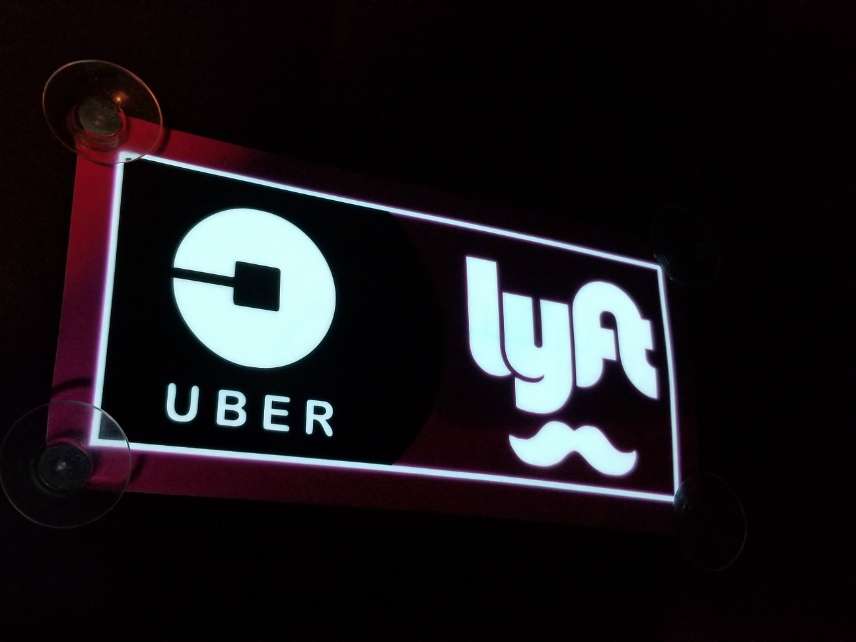San Francisco Ballot Initiative Would Tax Ridesharing Companies, Internet Sales, and Robot Cars
City Supervisor Aaron Peskin is on a quest to tax everything good about the 21st century.

Does San Francisco City Supervisor Aaron Peskin want to tax everything good about the 21st century? He's pushing a plan to levy new fees on ridesharing companies, internet sales, and driverless cars.
Peskin's ignoble effort began with a desire to squeeze the San Francisco–headquartered companies Uber and Lyft for more tax revenue. The companies currently pay San Francisco's gross recipients tax—as does most every business in the city—but California law forbids cities from imposing per-trip fees on ridesharing businesses, forcing Peskin to get creative.
In April he introduced legislation that created a whole new, higher-taxed category of San Francisco's existing gross receipts tax for "transportation network company services." It would apply almost exclusively to Uber and Lyft. In late May, city staff projected that the law would raise roughly $32 million a year.
Fearful that this might not pass legal muster, Peskin amended his legislation in June to also include "autonomous vehicle passenger services"—hitting driverless car companies such a Google's Waymo—and other private transit vehicle services.
The Supreme Court then ruled in South Dakota v. Wayfair that states and localities could in fact tax the internet sales of businesses that had no physical presence in their jurisdiction. So Peskin expanded his legislation again to incorporate any e-commerce businesses that make over $500,000 in sales in the city.
Peskin currently plans to put his proposal on the local November ballot, where it would need to earn only a bare majority to pass. Four supervisors need to approve Peskin's proposal before August 3 for it to qualify for the November ballot.
Despite the huge amounts of revenue this tax will generate—particularly after the inclusion of internet sales—its specific purpose isn't entirely clear. The revenue it collects will go straight to the city's general fund, from which it can be spent without restriction.
Peskin himself suggests that the taxes could pay, basically, for all good things. "It could go toward police enforcement. It could go to street resurfacing. It could go to traffic calming and pedestrian safety that we call Vision Zero. It could go to a whole host of things," he told local CBS affiliate KPIX earlier this year.
The actual text of his legislation argues that the city must raise taxes to "maintain a high quality of life and continued economic growth."
With the addition of e-commerce companies to the levy, protectionism has become a justification as well. Peskin legislative aide Sunny Angulo said at a Budget Committee hearing that "these e-commerce, internet businesses have had such a profound impact on our local small businesses, our brick-and-mortar mom-and-pop businesses in San Francisco." Taxing them would help level the playing field, she suggested.
Observers could be forgiven for calling the proposal a cash grab. And if that is indeed what Peskin's taxes are, then he has chosen a great means for getting the job done, says Nicole Kaeding of the Tax Foundation.
"For all their flaws, gross receipts taxes…produce a great deal of revenue because their base is much bigger than it would be under a sales tax and it also produces a very stable form of government revenue," says Kaeding.
The downside is that gross receipts taxes are blunt instruments that raise costs on all aspects of a company's business.
"That tax is going to get captured somewhere. It's either going to be through increased prices to consumers or to their labor force," says Kaeding. Uber or Lyft might choose to "not hire as many people, or not expand as fast in the city, or reduce hours or wages or benefits."
Ride share companies themselves have argued much the same thing.
"This is a lose-lose proposition for the people of San Francisco, directly costing residents millions of dollars while stifling economic opportunity for thousands of drivers. Living and working in San Francisco is expensive enough already, and this new ridesharing tax will only make it worse," said a Lyft spokesperson in a statement.
A principle of good government is that you should only ask voters for more money when you have a specific and pressing public need for it. Peskin's proposal instead operates on the principle that the money flowing to cutting-edge e-commerce businesses, ride-sharing services, and goddamn robot cars would be better spent by bureaucrats.
Rent Free is a weekly newsletter from Christian Britschgi on urbanism and the fight for less regulation, more housing, more property rights, and more freedom in America's cities.


Show Comments (25)